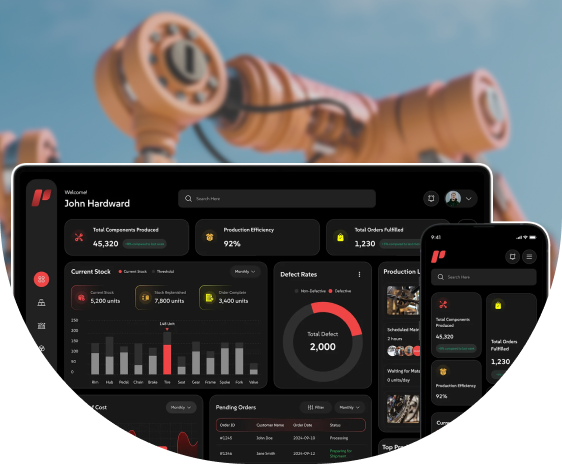


We are a manufacturing software development company that helps manufacturing businesses overcome challenges like real-time visibility into production status, equipment failures, manually dependent shop floor production lines, and legacy systems. Our expert team specializes in developing custom manufacturing software that seamlessly integrates with your existing systems.
Whether you need advanced production planning, inventory management, or predictive maintenance tools, we offer software solutions that leverage cutting-edge technologies to streamline your production processes and improve product quality.
















Discover our comprehensive range of specialized manufacturing solutions designed to address the unique challenges faced by manufacturing companies.
With unique processes, your manufacturing business needs software that fits like a glove to optimize its manufacturing processes. Hire dedicated developers to build personalized solutions that streamline workflows, boost machine performance, and drive business goals. Our tailored platforms enable you to make accurate, agile decisions, designed for both small units and large factories.
Digital transformation begins with the proper guidance through data analytics. We analyze your operations, identify growth blockers, and recommend tools such as IoT, AI, and automation to maximize your return on investment (ROI). Whether you're starting fresh or modernizing, our experts help you plan and implement a scalable digital roadmap.
Outdated systems slow you down, while our manufacturing software development services help modernize your software, propelling you forward. We upgrade your code, migrate infrastructure to the cloud, and enhance performance without disrupting operations. Enjoy seamless integration, faster workflows, and secure, future-ready platforms.
Never let siloed systems result in miscommunication, delays, and inefficiencies. Avail manufacturing software development services today and integrate all your internal systems like payment gateway, ERP, MES, CRM, inventory management, and more. As a result, you can expect friction-free data flow, improved coordination, and real-time visibility.
Unplanned downtime hampers productivity and overall business growth. We build predictive maintenance systems that leverage the Internet of Things, Machine Learning, Artificial Intelligence, and quality control to monitor equipment health and predict failures. It also extends machine life, reduces maintenance costs, and keeps your shop production line running smoothly with zero surprises.
Beyond machinery failure, workplace safety is another crucial area to consider. Connect with us today to build Occupational Health and Safety software that monitors risks, compliances, and conducts timely audits from centralized platforms. Our solutions aim to keep your manufacturing unit safe by ensuring you receive notifications about downtime, automated alerts, real-time dashboards, and swift reporting, ultimately enhancing customer satisfaction.
Our software development team excels at building custom manufacturing software platforms tailored to each business's specific requirements. With CRM, you can manage clients, track production, monitor orders, supplier performance, and streamline post-sales services. It enables your team to convert customers at a faster pace, cater to customers with better efforts, and build long-term relationships.
Machine operators need data to control the machinery. We can help you develop a Human-Machine interface software solution that enables your direct interaction with equipment. Our developed HMI software allows operators to efficiently manage the machine, enhance safety, and boost productivity on the shop floor.

Connect with a leading software development company with experience of over three decades in developing and deploying digital platforms for clients globally. Make your production line operational and automated 24/7 with zero surprises like:
We are manufacturing software development company that enables end-to-end manufacturing software solutions. We undertake real-time shop floor tracking to advanced inventory control and manufacturing planning. With our below-mentioned solution, you can expect streamlined workflows, minimize downtime, and drive efficiency across manufacturing unit.
We understand your manufacturing business objectives and then undertake custom software development for ERP solutions. Our digital solution comprises necessary modules (planning, production, finance, inventory, and supply chain) and features that easily integrate into your existing system. It enables you to monitor your manufacturing operations, identify bottlenecks, and enhance performance.
Hire manufacturing software developers to build execution software for your manufacturing business. It enables you to track, document, and control your entire production process on the shop floor, from raw materials to finished goods output. It empowers production visibility and control, while also helping you improve your decision-making process with real-time data. Moreover, it ensures consistent product quality and compliance through enhanced collaboration between planning and execution teams.
Are your manufacturers still using spreadsheets to plan, allocate, and optimize resources? Collaborate with supply chain management experts to develop software that optimizes production timelines, shift planning, and machine utilization. With this software, your production process will be up and running more often than facing uncertain downtime.
Never run out of stock with our inventory management software. Partner with us to develop smart supply chain management inventory system that not only manages raw materials but also notifies you proactively. With automated monitoring, reordering, and analytics, our software solution enables your production to run continuously around the clock.
If you are a customer-centric manufacturing company, you must also consider implementing effective inventory management software. You can easily monitor product quality at every stage of production, manage audits, and track compliance. Additionally, it ensures that quality standards are consistently met, including defect detection, waste reduction, and excellence at every stage.
Your manufacturing business requires ongoing attention in areas such as machine health and production bottlenecks. Build an equipment maintenance system that helps you track equipment health, schedule preventive checks, foresee potential failure, and notify you. Having such software by your side gives a sense of relief and allows for an uninterrupted production process.
Our consultants have a plethora of experience in delivering quality manufacturing enterprise solutions. Partner with us to get a competitive edge.
Talk to Our Specialists

Artificial Intelligence and advanced technologies, such as big data analytics, enable every phase of manufacturing, ranging from planning to production. With the use of AI, you can forecast demand, automate quality inspections, and foresee maintenance to reduce downtime. Moreover, the cutting-edge technology helps you detect patterns in real-time, optimize workflows, and make agile, data-backed decisions. As a result, you can expect an efficiency boost and reduced operational costs. AI streamlines planning, forecasting, inspections, and maintenance, thereby reducing downtime and enhancing agility. It reveals real-time patterns to optimize workflows and cut costs with smarter decisions.
Explore
Automation ensures the elimination of mundane tasks, and robotics enables precision in your production line. We have helped manufacturers with robotic systems with smart control and a digital platform that ensures automation in material handling, assembly, and inspection. It results in eliminating human errors, prioritizes safety, and provides speedy throughput while maintaining quality. Robotics brings unmatched precision, while automation removes repetitive tasks across production lines. This ensures faster output, fewer errors, and consistent product quality with enhanced safety.

You can create a digital twin of your physical machinery to test the performance in real-time without disrupting actual production. We help you build software that collects data (such as vibration, temperature, and speed) from your production equipment and simulates it into a digital twin, reflecting the real-time behavior of your production cycle virtually. As a result, you can predict equipment failure before it occurs and build preventive measures to enhance manufacturing operations, reduce downtime by implementing virtual diagnostics, improve product design through real-world usage, and enhance decision-making with operational insights.

Your factory’s production unit generates a wealth of data, which, if processed systematically, can provide valuable insights. Develop a digital solution with a prominent manufacturing software development company and evaluate performance metrics to track trends. Additionally, you can identify inefficiencies in production, inventory, energy usage, and labor. With data science and analytics, you can leverage both predictive and prescriptive analytics that help you with not only identifying challenges but also recommending necessary measures to fix the bottlenecks.

Digital inspection is another unexplored area that can offer potential insights into production quality, equipment health, and safety standards. We can help you with AI-backed image recognition and computer vision systems that enable you to detect defects, validate assembly lines, analyze high-quality products, and maintain consistency. Our software developers will integrate image analysis into your existing software to unburden the workforce with manual inspection and also minimize the costly rework.

Bring your entire manufacturing ecosystem to life by seamlessly connecting machines, systems, sensors, and human resources to one smart and responsive network. Monitor equipment health, energy usage, identify defects proactively, and save production from downtime. Get instant alerts and meticulous insights at your fingertips with no further hassle. With IoT, you, as a manufacturer, would be empowered with complete control and visibility into the shop floor, equipment health, and production stages.
ExploreDiscover the diverse range of industries we proudly support with our innovative software solutions to companies of different business verticals. Our expertise spans multiple sectors, ensuring tailored services for every unique need.
It takes somewhere around 6-12 months to build a manufacturing business analytics solution. The development encompasses project scope, UI/UX designs, the use of advanced technologies, workforce, and several other key factors. For a detailed understanding of the project timeline, please contact our software development services team and business consultants.
Several factors must be considered when finalizing the cost to build a new manufacturing & engineering software. It includes project complexity, required features, scalability, targeted platforms, and the location of development. A fully functional manufacturing IT solution would cost somewhere between $100,000 and $25,000. The cost may fluctuate based on the actual project requirement. So, they confirm with a leading software development company.
If your workflows are unique, require several integrations, and you plan for scalability, you must build a digital solution from scratch. It aligns with your business operations, offers flexibility, and evolves with business.
On the other hand, if your requirements are minimal, standard, and time-sensitive, you can proceed with purchasing a ready-made solution. However, you might need customization or integration, but the implementation will be quicker.
If you want a digital backbone for your manufacturing software and are interested in developing solutions, you can reap the benefits like:
Helps with planning and implementation, monitors real-time production, ensures quality, and improves shop floor visibility.
Unifies finance, HR, and procurement into a single system and promote operational efficiency.
Manages the entire product journey from design to disposal, accommodating innovation and maintaining regulatory compliance.
You can measure the ROI of manufacturing software by noticing:
SPEC House, Parth Complex, Near Swastik Cross Roads, Navarangpura, Ahmedabad 380009, INDIA.

This website uses cookies to ensure you get the best experience on our website. Read Spec India’s Privacy Policy